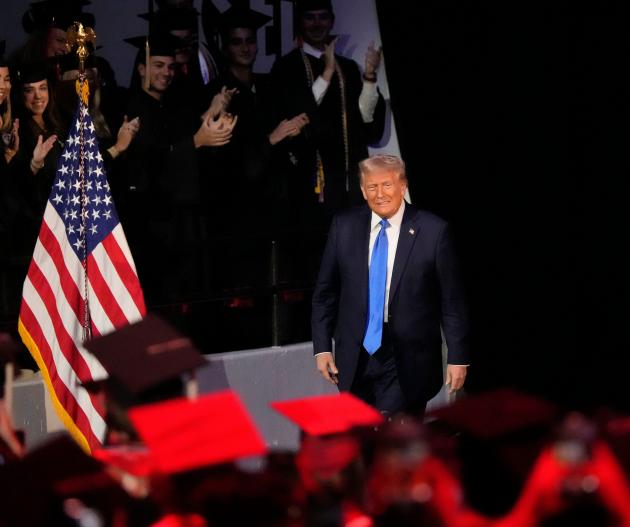As the United States honors its fallen heroes on Veterans Day, a proposal has sparked controversy and debate in the political arena. President Donald Trump has expressed his intention to rename the federal holiday commemorating the end of World War I from Veterans Day to Victory Day, a move that has left many wondering why and what implications this change would have.

For over 100 years, November 11 has been set aside to honor the sacrifices of American veterans who have served in the military, fought in wars, and protected the nation’s interests. The holiday has evolved over time, expanding to recognize the contributions and struggles of all American veterans, past and present. But Trump’s suggestion to rename it Victory Day has led to concerns about trivializing the sacrifices of those who fought in World War I, not to mention the ongoing struggles of modern-day veterans.

Practical Aspects and Challenges
Will the Name Change Become a Reality?

In order for a new federal holiday to be created, the process typically involves Congressional approval and a presidential proclamation. This can be a lengthy and challenging process, requiring bipartisan support and agreement on the holiday’s purpose and observance. Trump has already faced opposition to his previous attempts to create new holidays or change existing ones, and it is unclear whether he will be able to overcome the obstacles and secure the necessary support for his proposed “Victory Day” holidays.
Moreover, even if Trump is able to secure Congressional approval and issue a presidential proclamation, the name change would not automatically result in a day off for all Americans. Federal holidays typically apply only to federal employees and the District of Columbia, while private-sector employees and state and local government employees may not receive the day off unless their employers choose to do so.

What Does it Mean for Americans?
If Trump’s proposed “Victory Day” holidays were to become a reality, it could potentially impact Americans in various ways. For some, it may mean an additional day off from work, which could be beneficial for those who value the observance of these significant historical events. On the other hand, others may view the name change as unnecessary or even divisive, particularly if they do not feel that the holiday would be observed in a meaningful way.
Additionally, the name change could also have implications for employee benefits, such as paid time off, holidays, and vacations. Employers may need to adjust their policies and procedures to accommodate the new holiday, which could result in additional costs and administrative burdens.
Context and Precedents
Trump’s Previous Attempts to Change Holidays
Trump has previously attempted to create new holidays or change existing ones, although with varying degrees of success. For example, he signed a proclamation declaring February 9th as “Gulf of America Day,” although this holiday is not widely observed. He has also advocated for the return of Columbus Day, which some have criticized as a celebration of a controversial figure in American history.
Despite these efforts, Trump has faced opposition from lawmakers and critics who argue that the creation of new holidays or the renaming of existing ones is unnecessary or even divisive. This opposition could potentially impact his ability to secure support for his proposed “Victory Day” holidays.
Other Federal Holidays and Recognition Days
Federal holidays are created through the legislative process in Congress, and are typically applicable only to federal employees and the District of Columbia. There are currently 12 federal holidays in 2025, including New Year’s Day, Martin Luther King Jr. Day, Presidents Day, Memorial Day, Independence Day, Labor Day, Columbus Day, Veterans Day, Thanksgiving Day, and Christmas Day.
In addition to these federal holidays, there are also various recognition days and observances that are celebrated throughout the year. These may be recognized by the federal government, state and local governments, or private organizations, and may not necessarily result in a day off from work. Examples of recognition days include Juneteenth, Indigenous Peoples Day, and Arbor Day.
Conclusion
In conclusion, the article sheds light on President Trump’s proposal to rename Veterans Day to Victory Day, specifically to commemorate the 100th anniversary of World War I. The main argument presented is that Trump’s intention is to focus on the country’s military victories, rather than solely honoring veterans. The article also highlights the controversy surrounding the proposal, with many critics arguing that it would undermine the significance of Veterans Day and its purpose to recognize the sacrifices made by all veterans, regardless of the war.
The significance of this topic lies in its potential to alter the narrative surrounding American military history and the way we honor those who have served. If implemented, Trump’s proposal could have far-reaching implications, potentially dividing the nation and sparking heated debates about the role of war and patriotism in American culture. Moreover, it raises questions about the importance of remembering and learning from past conflicts, and whether a victory-centric approach would lead to a more nuanced understanding of the complexities of war.
As the nation continues to grapple with the complexities of war and patriotism, it is crucial that we approach this topic with sensitivity and respect. By doing so, we can ensure that our commemorations remain meaningful and inclusive, honoring the sacrifices of all veterans while also acknowledging the complexities of war. In the end, it is our collective responsibility to ensure that our celebrations of military service remain a powerful symbol of our nation’s values and principles, rather than a divisive tool. As we move forward, let us strive to remember and honor all who have served, and to never forget the true cost of war.
